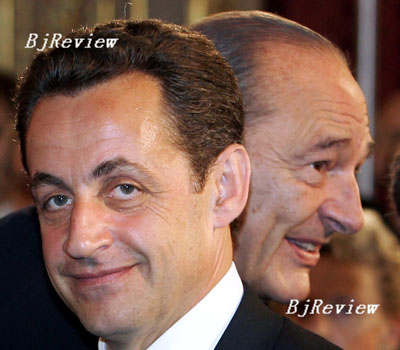
As Sarkozy took over the reins of France, increasing attention has been focused on the possible adjustments he will make regarding France’s relations with other major world powers. Adjustments seem to be inevitable-change is one constant in the world, especially in today’s France, where the election of a new president marked the end of an era.
First of all, we should take note of Sarkozy’s new work style. He stresses that the government shall determine and conduct the policy of the nation, a principle that is enshrined in the French Constitution. The tradition where the president is responsible for foreign policy will take on new features. New procedures will be introduced to French diplomacy to avoid diplomatic decisions that bypass parliament.
France’s independent foreign policy of peace is designed to protect the country’s national interests. It was conceptualized in the 1960s by President Charles de Gaulle based on France’s nuclear deterrence. The foreign policies of succeeding governments have been built upon de Gaulle’s legacy.
A country taking pride in its revolutionary tradition and innovative capacity, France has always been able to bring its independent foreign policy into full play. France makes its voice heard in the international community as a major world power because of its three key advantages: a permanent seat on the UN Security Council, status as a big nuclear power and an independent foreign policy of peace.
France is the fifth largest contributor to the UN budget. It holds that the UN is the only organization in the world that can authorize the use of force. Upholding “liberty, equality and fraternity” as core values, it shows deep concern over human rights issues, a tradition dating back to the Enlightenment in the 18th century. The National Constituent Assembly published the Declaration of the Rights of Man and of the Citizen in 1789. In 1948, the UN General Assembly adopted the Universal Declaration of Human Rights in Paris. French experts are working in the UN to oversee the implementation of the declaration in different countries and propose new human rights targets in light of developments in the world today.
After the end of the Cold War, France centered its foreign policy on promoting European integration to ensure the stability and prosperity of Europe and contribute to peace, democracy, development and progress of the international community.
Changing relations
China and France provide a compelling example of friendly cooperation. The two countries’ relations have seen continued progress, and each successive government in France has set great store in the China-France friendship. An enhanced comprehensive strategic partnership helps France raise its international profile and is in the common interests of the two countries. Two-way trade has soared in recent years, reaching $20.65 billion and $25.19 billion in 2005 and 2006 respectively. Chinese President Hu Jintao sent a congratulatory message to Sarkozy shortly after the final results of the elections were announced, a move that testifies to the importance of China-France relations.
Sarkozy is friendly to China. He paid three visits to China in 1991, 1995 and 2004. During his election campaign, he expressed a series of views on China. He hoped that the two countries’ relations would make more headway within the framework of the strategic partnership agreement signed in 2004. He pledged to give priority to relations with China and strengthen bilateral economic and trade ties to inject fresh vitality to the French economy. He noted that the bilateral relationship nurtured jointly by General de Gaulle and Chinese leaders was special. It occupies an important place in the multipolar world and is a major force in maintaining the balance of power. He also indicated that he would attend the 2008 Beijing Olympics. During a TV debate, he harshly criticized some candidates’ vows to boycott the Olympics.
To get a correct perception of China-France relations, it is imperative to view them from a strategic and long-term perspective. It is groundless to predict that China’s status will decline in France’s global strategy. There are also worries that France will switch to pragmatism to seek maximum commercial interests in China. Actually, it is a reasonable goal pursued by the two countries on the basis of equality and mutual benefit and is consistent with previous policies. The change will not lie in whether the policies are “rational” or “pragmatic,” but in the style and the pace of solving problems. For example, trade imbalances will be addressed structurally at the source rather than by relying on China’s large orders. Also, France will look upon China not only as a huge market but also as a competitor. While embracing the opportunities offered by China, it should meet its challenges. At the same time, it will focus on expanding trade ties with China, resolving the trade deficit and helping French small and medium-sized enterprises take a larger share of the Chinese market.
| 